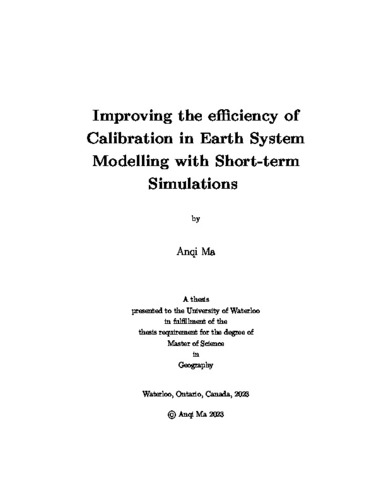| dc.contributor.author | Ma, Anqi | |
| dc.date.accessioned | 2023-09-07 15:02:40 (GMT) | |
| dc.date.available | 2023-09-07 15:02:40 (GMT) | |
| dc.date.issued | 2023-09-07 | |
| dc.date.submitted | 2023-09-07 | |
| dc.identifier.uri | http://hdl.handle.net/10012/19842 | |
| dc.description.abstract | Calibration is an important process in developing Earth system models to reduce the
deviations between model and observations and improve model performance. Current
calibration process is quite resource demanding, requiring enormous computing resources
to explore model responses to different parameter choices. In this study, we explored a
method using short-term simulations for training emulators to predict model responses
given parameter changes in calibration to potentially improve its efficiency. We generated
two Perturbed Parameter Ensembles (PPEs) using the same model configuration and
perturbed parameters values, but differ in the length of simulation. A significant linear
relationship between short and long-term simulations in model response to parameters
was found through EOF analysis. The contributions of each ensemble member in respond
to parameter values were very similar between PPEs ran for short and long-term, which
provided a support for using short-term simulations for emulator in calibration. The evaluation
of Gaussian Process emulator trained with short-term simulations showed that the
emulator trained with short-term simulations could capture major spatial variability in
long-term simulations and generally has a good performance in predicting model responses
to parameters. Nevertheless, there are more fragmented and chaotic components in model
responses in short-term simulations, which may be caused by the larger internal variability
in a shorter length of simulation. Such characteristics in short-term simulations may
lead to regional biases when assess model responses in regional scales or related to natural
variations using emulators trained with short-term simulations. Given that short-term
simulations require much less computational time to run, these results implied that it is
possible to use short-term simulations to improve the efficiency of calibration in the Earth
system modelling, while the potential regional biases should be aware of when assessing
model responses on regional bases. | en |
| dc.language.iso | en | en |
| dc.publisher | University of Waterloo | en |
| dc.subject | Earth System Modelling, calibration, cloud, climate | en |
| dc.title | Improving the efficiency of Calibration in Earth System Modelling with Short-term Simulations | en |
| dc.type | Master Thesis | en |
| dc.pending | false | |
| uws-etd.degree.department | Geography and Environmental Management | en |
| uws-etd.degree.discipline | Geography | en |
| uws-etd.degree.grantor | University of Waterloo | en |
| uws-etd.degree | Master of Science | en |
| uws-etd.embargo.terms | 0 | en |
| uws.contributor.advisor | Fletcher, Chris | |
| uws.contributor.affiliation1 | Faculty of Environment | en |
| uws.published.city | Waterloo | en |
| uws.published.country | Canada | en |
| uws.published.province | Ontario | en |
| uws.typeOfResource | Text | en |
| uws.peerReviewStatus | Unreviewed | en |
| uws.scholarLevel | Graduate | en |

